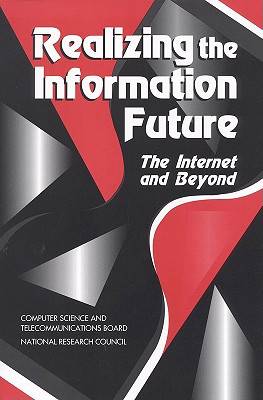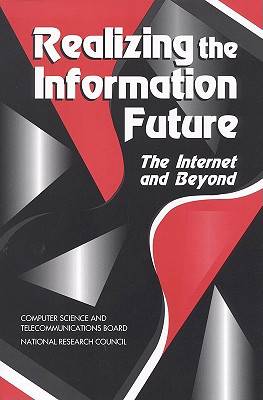
- Retrait gratuit dans votre magasin Club
- 7.000.000 titres dans notre catalogue
- Payer en toute sécurité
- Toujours un magasin près de chez vous
- Retrait gratuit dans votre magasin Club
- 7.000.0000 titres dans notre catalogue
- Payer en toute sécurité
- Toujours un magasin près de chez vous
Realizing the Information Future
The Internet and Beyond
National Research Council, Computer Science and Telecommunications Board, Nrenaissance CommitteeDescription
The potential impact of the information superhighway--what it will mean to daily work, shopping, and entertainment--is of concern to nearly everyone. In the rush to put the world on-line, special issues have emerged for researchers, educators and students, and library specialists.
At the same time, the research and education communities have a valuable head start when it comes to understanding computer communications networks, particularly Internet. With its roots in the research community, the Internet computer network now links tens of millions of people and extends well into the commercial world.
Realizing the Information Future is written by key players in the development of Internet and other data networks. The volume highlights what we can learn from Internet and how the research, education, and library communities can take full advantage of the information highway's promised reach through time and space.
This book presents a vision for the proposed national information infrastructure (NII): an open data network sending information services of all kinds, from suppliers of all kinds, to customers of all kinds, across network providers of all kinds.
Realizing the Information Future examines deployment issues for the NII in light of the proposed system architecture, with specific discussion of the needs of the research and education communities.
What is the role of the "institution" when everyone is online in their homes and offices? What are the consequences when citizens can easily access legal, medical, educational, and government services information from a single system? These and many other important questions are explored.
The committee also looks at the development of principles to address the potential for abuse and misuse of the information highway, covering:
- Equitable and affordable access to the network.
- Reasonable approaches to controlling the rising tide of electronic information.
- Rights and responsibilities relating to freedom of expression, intellectual property, individual privacy, and data security.
Realizing the Information Future includes a wide-ranging discussion of costs, pricing, and federal funding for network development and a discussion of the federal role in making the best technical choices to ensure that the expected social and economic benefits of the NII are realized.
The time for the research and education communities to have their say about the information highway is before the ribbon is cut. Realizing the Information Future provides a timely, readable, and comprehensive exploration of key issues--important to computer scientists and engineers, researchers, librarians and their administrators, educators, and individuals interested in the shape of the information network that will soon link us all.
Spécifications
Parties prenantes
- Auteur(s) :
- Editeur:
Contenu
- Nombre de pages :
- 320
- Langue:
- Anglais
Caractéristiques
- EAN:
- 9780309050449
- Date de parution :
- 01-02-94
- Format:
- Livre broché
- Format numérique:
- Trade paperback (VS)
- Dimensions :
- 154 mm x 230 mm
- Poids :
- 526 g

Les avis
Nous publions uniquement les avis qui respectent les conditions requises. Consultez nos conditions pour les avis.






